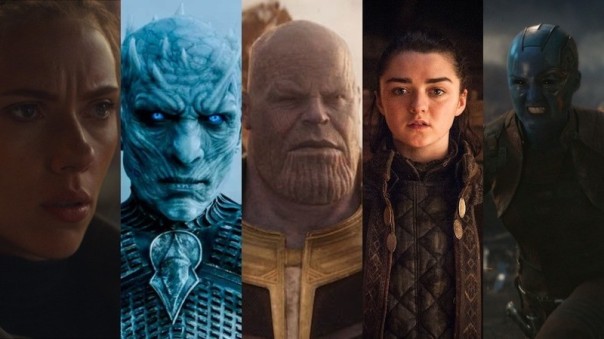
Nowadays, everyone’s a geek. Disney princesses use the Force, Marvel films are a defining aspect of the cultural landscape, and the most popular show on TV for the past decade has centrally featured dragon riders and ice zombies as key elements of its plot.
But I remember what it used to be like to be a geek, once upon a time in the dawn days before streaming and Disney buyouts. We geeks were a rare pariah clan, outcasts living on the fringe. We’d trade comics with friends, passing on our sacred texts. We convened in covens, playing Dungeons and Dragons with whoever else was out of the broom closet as a fellow lover of that dice-throwing game of magic and murder hobos. We allowed serious authors like Margaret Atwood to write in our favorite genres while dismissing those same genres, since no one respectable would write works of speculative fiction (egads!). We accepted mediocre superhero movies because Hollywood didn’t take the medium seriously even when adapting comics for the movies. And then, ever so gradually, things began to change.
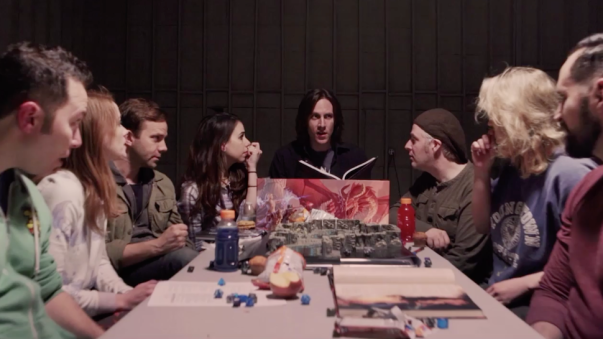
Part of the shift was probably caused by the mass appeal of Star Wars, which was given extra staying power through its wider universe (and the novels of Timothy Zahn–masterworks of storytelling that recaptured the essence of the original films while allowing the universe to outshine other fandoms). In the early 2000s, films like Peter Jackson’s adaptation of The Lord of the Rings and the first two Spider-Man films directed by Sam Raimi gave superheroes and high fantasy a serious treatment for mainstream audiences. Writer and director Kevin Smith helmed a Daredevil comic at the peak of his career that inspired other major Hollywood geeks like Joss Whedon to take a crack at the comics. In The Matrix, the Wachowskis created a cyberpunk film unlike anything seen before with all the philosophy and stunning visuals only found in anime at the time. The popularity of the BBC’s Doctor Who reboot, Magic: The Gathering trading cards, and pretty much every adaptation of Batman from 1989 to 2012 all (with the exception of the 1997 flop Batman and Robin--which is the filmic equivalent of throwing diarrhea onto a strobe light and of which no more need ever be said) did their part to ensure geekdom permeated the wider mainstream culture. And of course there was just the fact that the internet made everything more accessible to people who might not otherwise have been able to find and connect with their fandoms. But the two things which did the most to make geekery the new mainstream media standard were the MCU and Game of Thrones.
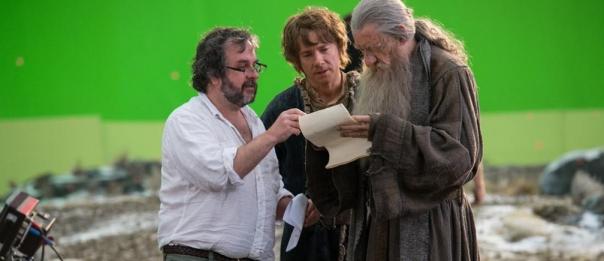
For context, back in 2008 when the first Iron Man film was released, audiences had no idea what it’s impact was. We were happy to have a superhero movie that was fun and that had more plot than the average toy commercial. But that was the summer of a different superhero film: The Dark Knight. Christopher Nolan’s epic masterpiece of grimdark noir storytelling captured the essence of Gotham’s caped crusader, his rivalry with the Joker, and the desperation of one man trying to impose his will on a city. The series took inspiration from the noir stories of Frank Miller (and echoed some of Miller’s more problematic politics, adapted for the Bush era). But compared to the Dark Knight, no one cared about Iron Man.
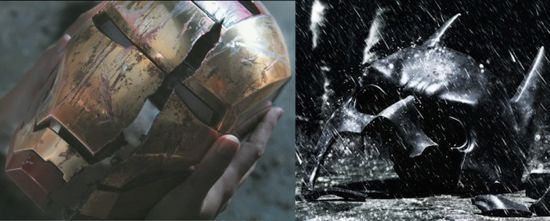
Both characters were superheroes without superpowers who put on a suit full of fancy gadgets, outsmarted their enemies, and had a flagrant disrespect for authority. But whereas Tony Stark is a wisecracking alcoholic who makes a living profiteering from war and has a startling naivety about his company, Bruce Wayne had a sense of gritty pathos audiences connected with. Batman is just a more interesting hero. And the Joker is a far more interesting villain than Iron Monger.
Then Marvel released another film, The Incredible Hulk, which was mostly forgettable. Except that it was directly connected to Iron Man. SHIELD appeared in both. Nick Fury appeared in both! The two shared the same universe and gave us logical consistencies normally not seen in superhero movies, something that emulated the comics (a point many others have already written about). This continued throughout the Marvel movies for both Thor and Captain America (as well as Iron Man 2), and with each of these, hype grew. By the time The Avengers hit theaters in 2012, Disney had spent a small fortune promoting the buildup of this epic shared universe over the course of five years. They had constructed an audience of superhero fans where there had not been one before. And their marketing efforts paid off after director Joss Whedon delivered a masterpiece.
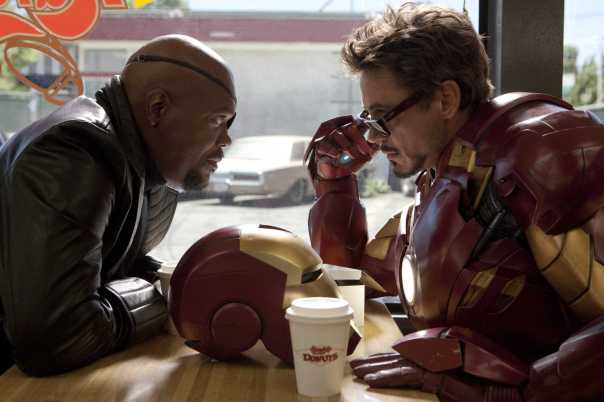
I will never forget the absolute misery of a bunch of drunken redneck bros sitting behind me in the theater the night Captain America: The First Avenger had its midnight release as these specimens of American manboy bravado chanted that George Bush was the real Captain America and obnoxiously kicked my seat. But you know what? Even before The Avengers came out, these guys were joining lifelong comics fans to show up for a midnight release of a Marvel film! And that’s because Disney had generated hype for non-comics fans to love these characters too.
It has been stated that the comics fans are not the same audience as the movie fans. This is probably true for the most part. But I became a major comic fan in college, after watching the first Iron Man film and The Dark Knight. Friends lent me their comics to read, or else told me the long and complicated histories of the X-Men, Avengers, or Batman over evenings spent awake late into the night. A large part of why I got to be a fan of the comics was because of the movies. And now, friends who enjoyed the movies are interested in which comics to pick up. But before they’ve immersed themselves into the written material, people already know characters like Thanos and Bucky or can argue about the properties of adamantium versus vibranium.
At around the same time that Captain America: The Winter Soldier and Thor hit theaters, a major TV show first aired. And even if I hadn’t spoiled it for you earlier, you’d know I was talking about Game of Thrones, because that’s the show which has been taken in by audiences the world over. When I used to teach English in Yokohama, Japan, my middle school students were fans of Game of Thrones. When I look at travel to places in Northern Ireland or Iceland or Croatia or Malta, the tourist websites insist on promoting locations that they plug as where Game of Thrones was filmed! When my liberal Jewish father and his neocon born again best friend want a conversation where they both agree, they geek out on Game of Thrones.
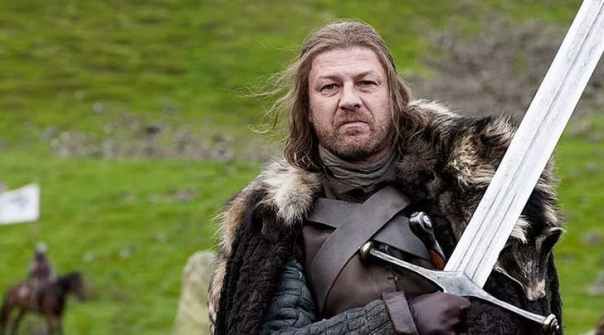
There are plenty of reasons to love the show. It’s rich cast of characters with diverse ideologies and experiences are entangled in a heartbreakingly intense yet exhilarating story! The sets are beautiful! The sex and violence were unlike much of anything else on TV at the time of the show’s release. No character is safe from death, while the various plot twists make anything seem possible. And again, I am speaking about a topic about which so much ink has been spilled (or, since everything is digital these days, about which so many pixels of text and streamed video content have been generated).
People have followed the two franchises of the Marvel Cinematic Universe and of Game of Thrones with a religious fervor. The term “fan” is short for fanatic, and that fanaticism has been waged as war in the comments sections of the internet or uplifted as reverent prayer-like praise with the release of each new installment of these serials. Beloved characters have died, and fans the world over wept. YouTubers made careers discussing the content of these franchises. These two series defined a decade.
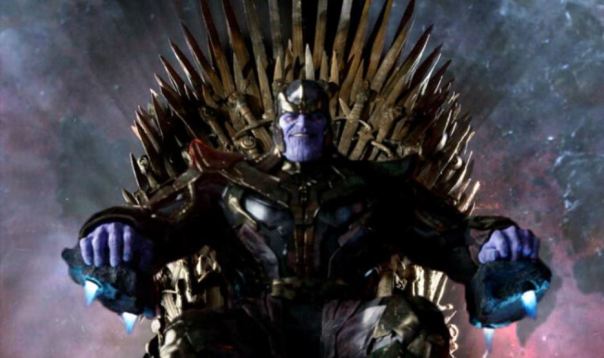
And now, they’re over.
Sure, we will get more content. There will be movies for Spider-Man, Black Panther, and the Guardians of the Galaxy. Game of Thrones has a prequel series being developed that supposedly explores some of the lore of Westeros prior to the coming of the Targaryens and their dragons. Various shows set in the MCU have been scheduled for release on Disney’s streaming service. But really, these shows have built up to a climax for years. And now, each has had that climax.
Part of me feels relief that new stories can grow. Will comics like The Sandman and Transmetropolitan finally get the on-screen adaptations they deserve? Will the X-Men and Fantastic Four be given another chance? Can we expect fantasy masterpieces like N. K. Jemisin’s The Fifth Season and Octavia Butler’s Wild Seed to have a level of loving respect shown to them the way Tolkien’s trilogy was handled by Peter Jackson? Look at how awesome Good Omens turned out, or the fact that we have shows for such philosophically and narratively complex works as Garth Ennis’s Preacher and Justin Cronin’s The Passage. There is so much potential for a new era of storytelling!
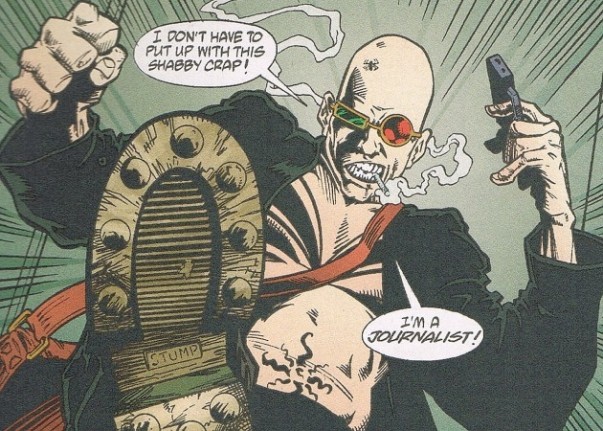
Also, we might FINALLY get some good DC films. And then there’s the fact that Valiant Comics have a six-film franchise in the works with Sony! So many great works are already in development, but without Marvel and Game of Thrones dominating the dialogue, these will get a chance to shine!
On the other hand, I have some serious trepidation. Already, we have seen formulaic filmmaking become the norm with weak villains and weak stories. Disney has been guilty of queer erasure, cutting scenes from Black Panther and Thor: Ragnarok which featured LGBTQ+ characters. The desire to feature military tech in movies results in making deals with branches of the US armed services, creating contracts where films serve as military propaganda (see Captain Marvel, Man of Steel, and all the Captain America movies for reference–or check out the amazing video essay by YouTuber Just Write on the topic featured here). Warner Bros has tried to force franchises into existence without consideration for good writing, good characters, or the fact that hiring Zach Snyder results in a bunch of movies promoting fascist propaganda.
Fantasy and science fiction are about pushing the mainstream culture. Superheroes were about challenging the evils of the world. But now, we don’t have real stories with real ideas. We have brands. Disney. Marvel. HBO. Fox. Amazon. These are the megacorps right out of a cyberpunk dystopia, and as we now live in a world where the majority of dystopias feel a lot more like daily life than speculative fiction, we as a society clearly haven’t learned any lessons. Do we really want fans to be loyal to companies like Disney and Amazon with a history of abusing their workers? Do we want major companies to adapt works which ask difficult questions and then sanitize these works to make them more palatable?
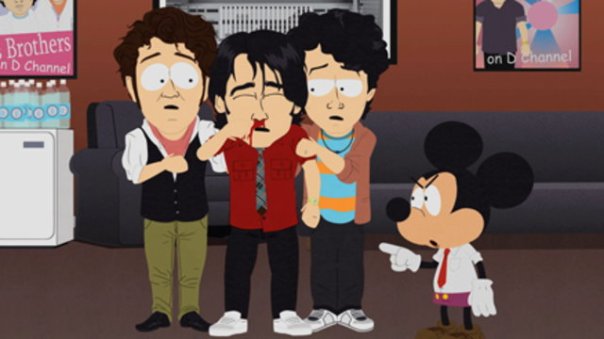
I’m worried about the future of geekdom.
And I don’t know what to expect for the future of geek media. But there is clearly a demand for more. People are hungry for stories about what could be possible, and companies like Disney and HBO have manufactured an audience of fans who are eager for more. But if the same old formulaic content is being produced by the big media companies, fans will look elsewhere for new stories and new ideas. Authors with transgressive ideas will get a platform–authors like Octavia Butler and Kim Stanley Robinson and Ursula K. Le Guin–and their ideas might actually challenge the status quo by helping people to imagine what is possible, and make the world into something more than the cyberpunk stories of the 80s and 90s told us it could be.
I am choosing to be hopeful for the future of geek culture. And while I love both Game of Thrones and the MCU, I am ready for them to be over. They needed to come to an end. And while they will be drawn out for some time, it is time to see what is next.
-
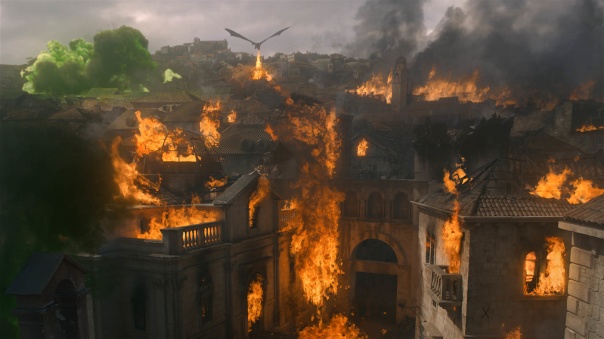
I really hope this isn’t the future of mainstream geekdom.
At the time of writing this, the last Game of Thrones episode aired only a few hours ago. I am sitting here having watched the first scene on my laptop. The episode opened with HBO promoting their other big series with a gish gallop of enticements (clearly hoping people won’t cancel the channel). In the first scene, Tyrion walks through the burnt ruins of King’s Landing, staring in horror at the broken wreckage of what is left. The first line spoken is Tyrion telling Jon “I’ll find you later”–perhaps a hint from the directors that though the show is over, there is more to come. But really, like the burnt out city which Daenerys hoped to turn into her capital, its time is over.
Now, it’s time for me to see the end. Winter has come, and I have one more episode to watch before letting this franchise go to the Many-Faced God. So, like Tyrion, I say, “I’ll find you later.”